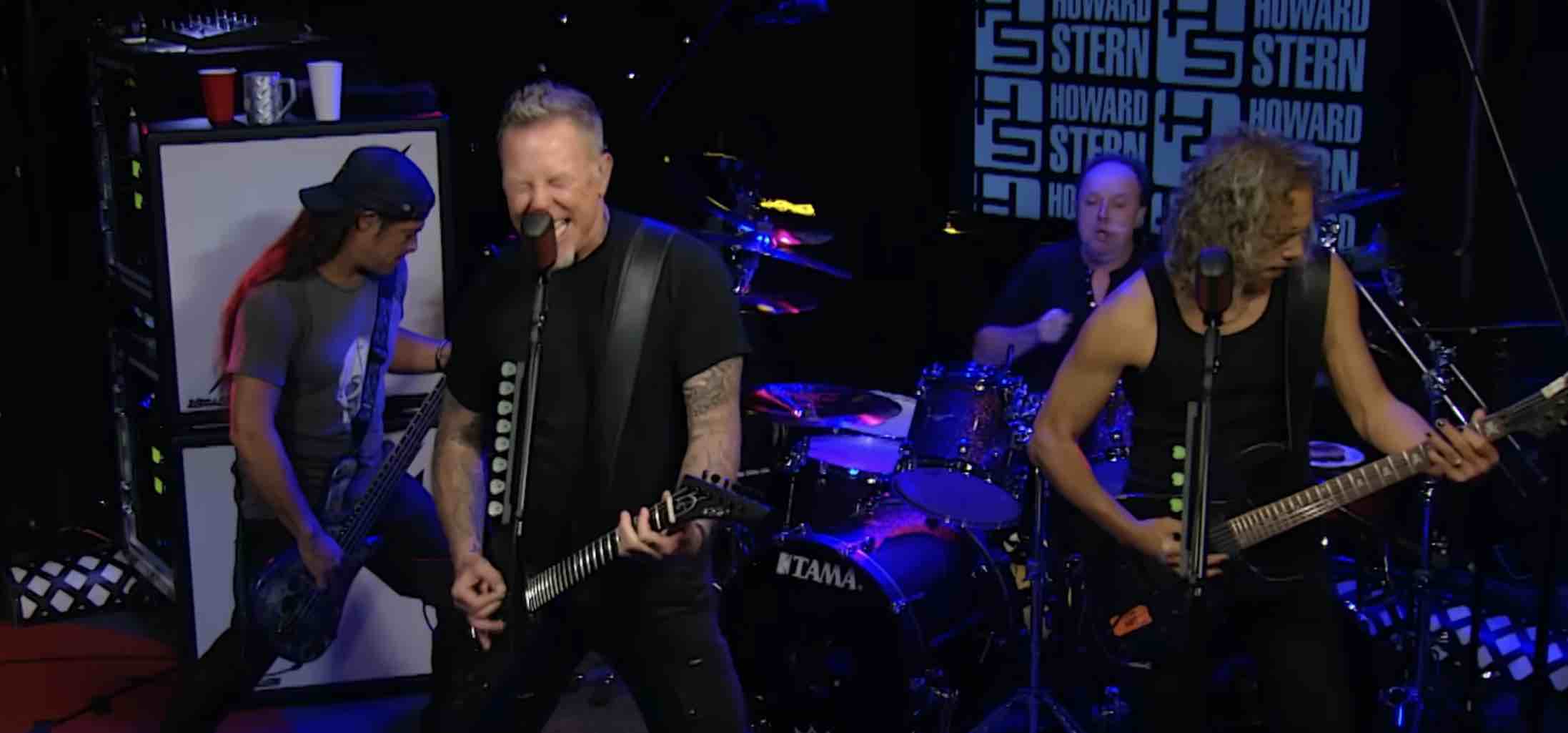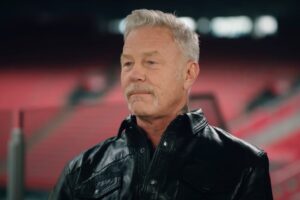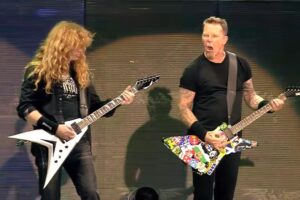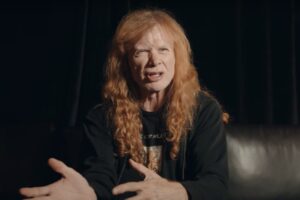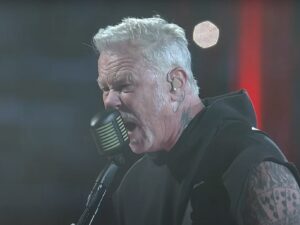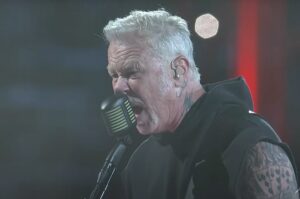Metallica: News, History & Updates
Metallica Biography
By DAVID ELLEFSON from MEGADETH, exclusively for Alternative Nation
No Life ‘Til Leather
David Ellefson: Ron McGovney is the first bass player I heard with Metallica. Because knowing Dave in June of 1983, he was literally six weeks out of Metallica. And the first Metallica music I heard was the No Life ’til Leather demo in his apartment. And when I heard it, it was so heavy and eerie and just daunting and yet vicious and had real teeth to it. And what I heard in the bass playing, because people were talking about Cliff Burton, but I’m hearing Ron McGovney [Burton replaced McGovney in late 1982].
Because Kill ‘Em All was being recorded at that summer in ’83, so I heard and became familiar with the No Life ’til Leather versions of what became Kill ‘Em All, basically, minus “(Anesthesia) – Pulling Teeth” Because that was not on the demo, it was on the Kill ‘Em All album. Ron, to me, had this mentality like, Ian hill of Judas Priest, Cliff Williams of AC/DC – where he had these simple basslines, but they were effective because they really laid the floor and the groundwork for these big riffs and the vocals to come out on top of it. It’s almost like a self-sacrifice, right? You sort of sacrifice your own fingerboard acrobatics on the bass for the betterment of the song.
And I really love how Ron played on No Life ’til Leather. I would argue it’s still some of my favorite Metallica music, probably because it’s the first one. It’s kind of like Kiss: Destroyer will always be my favorite because it’s the first record I heard and bought from them. Same with Queen: A Night at the Opera. Y’know, Sweet: Desolation Boulevard, etc. It’s the kind of the first one has that special thing to it, and that’s what No Life ’til Leather was, for me. That was the first Metallica music I heard.
And of course, it features Dave, his compositions, his rhythm and lead guitar performances. So, that was a very different band. To my opinion, that recorded moment was one band, and then they’ve sort of transitioned from there. Including several different bass players, all who have been fantastic. But Ron McGovney has a special spot in my heart, because in my opinion, he is the original Metallica bass player, and he’s the OG. So, I have a real affinity for how he played and how he recorded those songs.
Master of Puppets
David Ellefson: I was blown away by that album. One of the first things you can tell in the quality of a production of the record is in the drums. That’s usually where you can tell whether money was spent on it or not. And I wasn’t such a big fan of Ride the Lightning. I like the songs on it. I wasn’t such a fan of the production. I liked No Life ‘Til Leather, I liked Kill ‘Em All. To me, Ride the Lightning, I just didn’t care for the production of it as much.
Master of Puppets, I thought they hit fucking the mother lode. Just, they hit gold with that. The drum parts and the sound of the drums is incredible. And of course, the production of the record is great. Flemming Rasmussen did a phenomenal job recording the band. But just as much the songs went to just a whole other level. Mike Portnoy and I have had this discussion about the first album’s fun, the second album can be a challenge, and if you get to album three, you might actually have a career. [Laughs] So for me, when I heard not only album three, but how great Master of Puppets was, it is probably I would say it is my favorite Metallica record.
And not just for how great it is, but I think probably it represents something very special to me in my life at that time, because I think around that time was when we were putting out…it came out right before Peace Sells…But Who’s Buying? I think when we were making Peace Sells, we were probably hearing Master of Puppets on KNAC – big metal radio station in LA. We could hear it on the radio. Metallica didn’t make videos in those days, so you couldn’t see them, other than to go see them live in concert.
So I remember Dave and I, we went and saw them opening for Ozzy on The Ultimate Sin tour in Rutherford, New Jersey. And Michael Alago, who signed Metallica to Elektra Records, was courting us. And he we flew to New York with the Peace Sells album finished in our hands for Combat Records, and major labels were starting to throw a line in the water to sign Megadeth. and Michael Alago with Elektra was one of them. And he was the first one, really.
And so we went over to see Metallica that night in in New Jersey. And it was just next level big. I mean, you could just tell that this band was on fire. It was unstoppable. There was nothing in the front view mirror that could possibly derail this band. And the irony that only a few [months] later, the bus accident would take Cliff Burton’s life, and forever changed the trajectory of that band and everything else. And look, Cliff’s death inspired the writing of the [Megadeth] song In My Darkest Hour. So, that had a huge impact, even into what would become our third album, So Far, So Good…So What!
The History of Metal Can Be Looked at as Pre-Black Album and Post Black Album
David Ellefson: For sure. 100%. Yeah. Because to me, there’s ’80s and then Black Album, Rust in Peace, Countdown to Extinction – that is ’90s stuff. It’s interesting, …And Justice for All, to me, is very much an 80s record. It came out in ’88. They toured it through ’89. So, that was still the, the ’80s. Flanking us to the side was this new band, Guns N’ Roses with Appetite for Destruction. There’s all this stuff going on. The icons like Aerosmith were owning MTV.
And then, of course, it would focus in a bit in the early ’90s, before Seattle music hit. But yeah, I think metal music for sure, you could differentiate pre-Black Album, post-Black Album. And for maybe Megadeth fans, there’s pre-Rust in Peace and then there’s the post-Rust in Peace. Which, our Rust in Peace line-up carried through the next decade, through the 90s. So, I think those are probably two defining moments for metal, for sure.
What Made Cliff Burton Unique as a Bassist?
David Ellefson: Visually, certainly his headbanging. He like, had his own internal metronome or his own internal clock, because it’s not like he headbanged in the traditional sense that most of us headbang on the snare drum. That was kind of the thing. And that even you could see started with Motörhead videos, and then that played into our cadence of how the headbanging, and Cliff just sort of beat to his own drum. And so there was a visual aspect of Cliff, and then there was a musical aspect of him.
Musically, I felt like it was James, Lars, and Kirk. And then Cliff was sort of this maestro who sort of was overshadowed. Sort of sort of looking in on everything, and then he would weigh in from time to time. And when he weighed in, it mattered – y’know, “(Anesthesia) – Pulling Teeth,” “Orion,” “For Whom the Bell Tolls.” Each of those three albums he played on, had significant Cliff moments. And I guess probably later in my own career, I realized I had the same thing. I got to have that same thing with my own bass playing and my own musical participations where the bass parts mattered.
And look, I’m going to give all the credit to Steve Harris, because he changed the arc of where a bass player sat in the orchestra of a metal band. Because usually the bass was sort of in the back. It was a supporting role. Steve took it right to the front of the stage. He was a frontman right next to his lead singer. But Steve was as much of the front man of the band as the lead singer. It was like, Iron Maiden always had two frontmen, Steve and Paul Di’anno or Bruce Dickinson. And I guess for a minute, Blaze Bailey. But to me, Steve is 50% of the front of the band. That really gave all of us bass player’s permission to do that.
And I think for me, growing up as a kid, I always felt like that, because I was a Gene Simmons fan. And so again, the front line of Kiss was Gene and Paul, with Ace peeking in from time to time. You know what I mean? So I guess I probably grew up more with the Gene and Paul thing. And then Steve comes along, so that, I think, influenced everything that came after it, with all of us bass players of the thrash scene. Y’know, Dan Lilker, Frank Bello, Cliff, me. I feel like we were off the chain, and it was okay to just fucking go, and really bring your best to the front line of the band, both visually and sonically.
Cliff Burton’s Passing on September 27, 1986
David Ellefson: So, me, Dave and Chris Poland had a three bedroom apartment over in Silver Lake, east of Hollywood in Los Angeles. Once we got our Capitol Records money for Peace Sells, we just had an apartment there for a few years. And I forget if it was in the morning or in the evening. I forget the time of day, but Metal Maria – Maria Ferraro, who also owns Adrenaline PR – she worked for and was dear friends with Jon and Marsha Zazula at Megaforce Records, and she called the apartment. And was hysterical. But she called to let Dave know that Cliff had passed.
And I don’t remember who answered the phone, but I remember very clearly, sitting over in our living room area of the apartment, seeing Dave on the phone, and it was just heavy. It was quiet. And after that call, Dave picked up his guitar and started playing – and that was the beginning of the song that became In My Darkest Hour.
Lyrically, that song has some heaviness to it that could be around that topic, although that’s not really kind of the final outcome of the topic of the song. But it certainly gave the heaviness and the weight to the moment. And the introspective, almost brooding cadence of the of the mood of the song was definitely sparked by the sadness and the sort of stunning moment of that phone call – to find out that Cliff had passed.
Tribute to Cliff Burton
David Ellefson: Silver Lining Music has this new Metallica tribute record coming out, called No Life ’til Leather: A Tribute to Metallica’s Kill ‘Em All, where I recorded an homage to Cliff Burton. They asked me to record “(Anesthesia) – Pulling Teeth,” which is, to me, a coveted piece of material that, up until I recorded it, in my opinion, it was pretty much “off limits.” It’s just not something you go to, y’know? Like, nobody goes and re-records “Eruption” by Eddie Van Halen and puts it on an album. It’s forbidden, it’s sacred, hallowed ground. So, I’m really honored that they asked me to do it. For me, it’s an esteemed brotherhood to our fallen hero, Cliff Burton.
Because Cliff was a little older than me. Obviously, Metallica was established a couple years ahead of Megadeth, but at the same time, we kind of grew up together. [Megadeth] were the younger brother of Metallica. [Laughs] Yet, we’re all a branch off the family tree to a certain degree. So, I was very honored that they that they asked me to do that.
David Ellefson interview conducted exclusively by Greg Prato for Alternative Nation.


